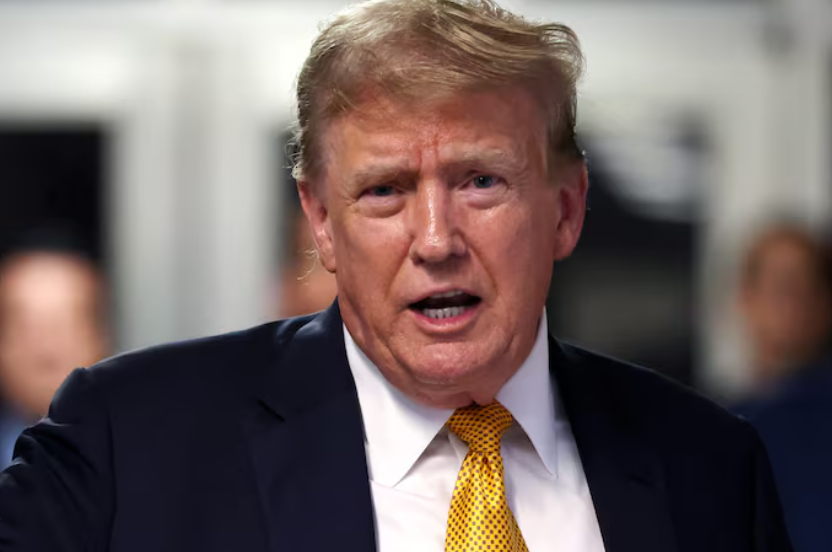Authorities prepared for an only-in-America blockbuster trial, featuring a former president in the dock, Donald Trump. This case promised salacious details and forced Trump, once the world’s most powerful figure and now vying for power again, to face allegations of an awkward sexual encounter with a porn actress. The trial became a political and legal thriller, with Trump, not known for humility, having to listen to descriptions of his satin pyjamas and comparisons to a “Cheeto-dusted cartoon villain.”
Despite weeks of testimony, millions of documents, and live TV cameras outside the courtroom, the American public appeared detached. A recent YouGov/Yahoo News poll showed only 16% of respondents followed the trial “very closely,” and only a third had a mild interest. More Americans felt “bored” or “angry” than interested in the trial. Other polls during the trial found similar results.
As the jury’s verdict approached, pundits and pollsters, who once anticipated a national moment, now felt the outcome might fizzle rather than explode. Throughout the six-week trial, Trump denied having sex with Stormy Daniels, real name Stephanie Clifford, while his lawyers portrayed her as a fabricator. Daniels capitalized on her notoriety by selling merchandise, including a “Stormy, saint of indictments” candle.
In a memorable exchange, Trump’s defense attorney Susan Necheles accused Daniels of making phony sex stories. Daniels retorted that the sex in her films was real, just like in that hotel room encounter. She described Trump in his pyjamas, undressing while she used the bathroom, leading to an unprotected, unexpected encounter.
However, the case focused more on the alleged crime of covering up the story. Shortly before the 2016 election, Michael Cohen, Trump’s lawyer, paid Daniels $130,000 for her silence, which prosecutors argued was to keep the story from the voting public. They claimed that, with the election looming and the campaign reeling from the “Access Hollywood” tape, the Trump campaign needed to buy Daniels’ silence.
Trump has always denied having sex with Daniels. His lawyers have attempted to portray her as a fabricator who used her notoriety for financial gain, including selling merchandise like a “Stormy, saint of indictments” candle. In a notable exchange, Trump’s defense attorney accused Daniels of making phony sex stories, to which she retorted that the sex in her films was real, just like the encounter in the hotel room. She painted a picture of Trump in satin pyjamas, undressing while she used the bathroom, leading to an unprotected, unexpected sexual encounter.
The case is not about what happened in the hotel room but about the alleged crime of covering it up. Shortly before the 2016 election, Michael Cohen, Trump’s lawyer, paid Daniels $130,000 for her silence, which prosecutors argue was to keep the story from the voting public. With the election looming and the campaign reeling from the release of the “Access Hollywood” tape, Trump’s campaign needed to buy Daniels’ silence.
Stormy Daniels testified, describing a presuming Trump in satin pyjamas, leading to an unprotected, unexpected encounter. The case focused on the crime of covering up the story rather than the incident itself. Shortly before the 2016 election, Cohen paid Daniels $130,000 for her silence, which prosecutors argued was to keep the story from the voting public. With the election looming and the campaign reeling from the “Access Hollywood” tape, Trump’s campaign needed to buy Daniels’ silence.
Public indifference to the case might not be surprising. Trump is a known figure with a long history of courting outrage, and perceptions of his wrongdoing divide sharply along political lines. The American voter is less prudish than many assume, as seen during Bill Clinton’s scandal in the late 1990s. Polls during Clinton’s impeachment trial showed similar public disinterest. Clinton was acquitted, and Trump might also be getting a pass from the public, if not from the criminal justice system.
The Manhattan trial is seen as the weakest of the four criminal cases Trump faces. It hinges on a bookkeeping offense, alleging the falsification of reimbursements to Cohen as legal fees rather than hush-money payments. The case’s merits and chances of success are divisive, and the perception of a political element is unavoidable, given that Manhattan District Attorney Alvin Bragg openly campaigned on taking on Trump in the courts. Trump has exploited this, alleging authoritarian persecution while making speeches from the courthouse steps.
As the verdict loomed, Trump held a rally in the Bronx, a heavily Democratic area. Supporters, donning MAGA hats, expressed fervent passion for Trump’s norm-bending approach. Rojah Watson, a Bronx-born doorman, said Trump’s threats to use a second term to bend the justice department to his will and prosecute Joe Biden attracted him. Another supporter, TK, dismissed the charges about Stormy Daniels as Trump’s personal life, insisting on Trump’s need to assert himself.
The hush-money payment case is heavy on sexual scandal and built on a complex legal argument. Win or lose, Trump will spin the outcome to his political advantage. An acquittal will prove the trial was a “witch-hunt,” and a conviction will make him a martyr among his supporters. Some polling suggests a criminal conviction might deter some Trump supporters, but it’s uncertain if it would finally be a bridge too far for his loyal base.
Trump’s legal challenges continue, but his political momentum remains largely unchecked by the legal system. With other serious cases mired in legal challenges, the New York hush-money case stands as the primary trial likely to occur before the 5 November election. As the wheels of justice turn, Trump’s disruptive danger to the US political system remains part of his appeal to many supporters.

